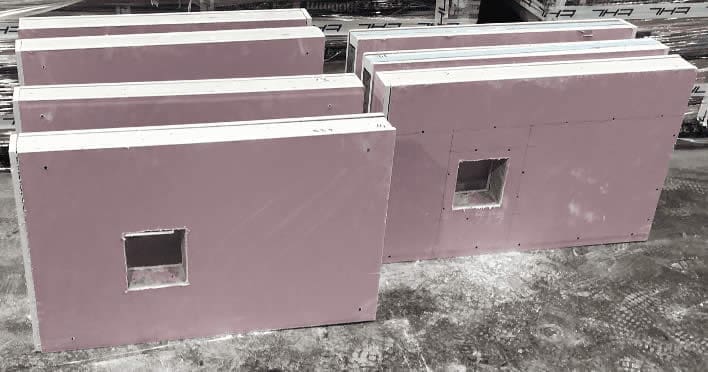In the rapidly evolving construction industry, factory-fabricated drywall components are heralding a new era of efficiency and precision. This blog delves into the myriad benefits that these innovative materials bring to building projects, comparing them with traditional drywall methods and highlighting their customizable features.
What is Factory-Fabricated Drywall?
Factory-fabricated drywall involves pre-constructing wall components in a controlled factory setting and then transporting them to the construction site. This method contrasts with traditional drywall, which workers typically measure, cut, and install manually on-site. Factory fabrication leverages advanced manufacturing techniques to ensure precise dimensions, integrated features, and consistent quality.
Benefits of Prefabricated Construction Materials
The shift towards prefabrication is driven by several compelling advantages:
- Efficiency: Projects often see a significant reduction in build time as components arrive on-site ready for quick assembly.
- Quality Control: Factory settings allow for stringent quality checks that are not possible in the variable conditions of a construction site.
- Reduced Waste: Precise measurements and machine cutting reduce material wastage, supporting environmentally sustainable construction practices.
- Cost-Effectiveness: With faster construction times and reduced waste, the overall cost of projects can decrease, making prefabrication a cost-effective option.
Factory-Fabricated vs. Traditional Drywall
Comparing factory-fabricated drywall to traditional drywall highlights several key differences:
- Installation Speed: Factory-fabricated components can be installed much faster than traditional drywall, which requires onsite measuring and cutting.
- Consistency: The uniform quality of prefabricated components ensures that every piece meets the same standard, which can be challenging to achieve with onsite fabrication.
- Customization: Despite popular belief, factory-fabricated drywall can be highly customisable to meet specific architectural needs.
Customisable Factory-Fabricated Drywall Solutions
One of the most significant advantages of factory-fabricated drywall is its adaptability. Modern manufacturing technologies allow for a variety of shapes, sizes, and features, including pre-cut openings for windows and doors, integrated conduits for electrical and plumbing systems, and even specialised acoustic or fire-resistant properties.
FAQs
Can factory-fabricated drywall meet specific design requirements?
Yes, you can tailor this drywall to meet specific design requirements due to its high adaptability. Manufacturers can adjust sizes, shapes, and include custom features such as mouldings, cutouts, or any special detailing required by a project. This makes it an excellent choice for projects with unique architectural elements or specific performance criteria.
How do transportation and handling affect the integrity of prefabricated components?
We design factory-fabricated components to be robust and often reinforce them to withstand the rigours of transportation. Manufacturers typically use protective packaging and careful loading techniques to ensure that components arrive at the construction site in perfect condition. Additionally, our installation teams properly handle these materials, reducing the risk of damage during unloading and installation.
What are the long-term benefits of choosing prefabricated over traditional methods?
The long-term benefits of choosing prefabricated drywall include not only reduced initial construction time and costs but also long-term durability and easier maintenance. Building prefabricated walls to precise specifications improves the overall quality of the build. This precision leads to better sealed interiors, which can enhance energy efficiency and reduce long-term operational costs.
Conclusion
The adoption of factory-fabricated drywall is a smart choice for those looking to leverage the latest advancements in construction technology.
With benefits ranging from reduced construction time to enhanced quality and customisation, it is clear why more and more industry professionals are choosing this cutting-edge solution.


